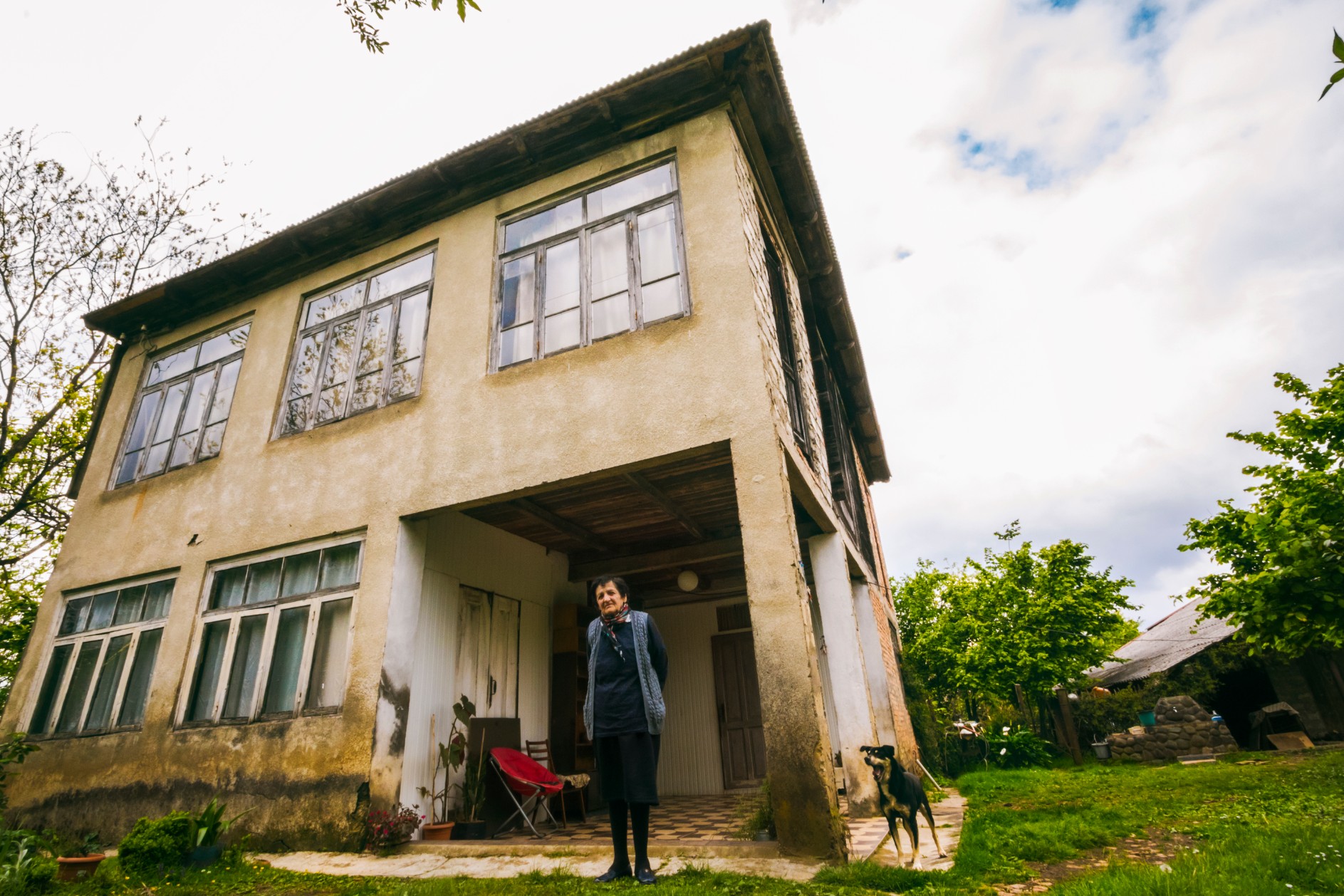Rusudan Chelidze, 80 years old, Upper Bakhvi, Guria
Repressed childhood
———————————-
I had nothing like childhood. Two sisters, we were alone in this world, having nobody except each other…
Both of our parents suffered political repressions. Shortly after my father was sent to GULAG, my mother was arrested too. In those days, it was happening a lot – they uprooted entire families. In my father’s case, the pretext was that his brother was a refugee in France. Somebody told my uncle he was on the blacklist and they were going to arrest him. So, he escaped. Later he sent us a letter saying he managed to get to France through Turkey. Friends of his, who were members of The First Republic, helped him to reach there. There he died and is buried in the Leuville cemetery. There were spies all around back then. Somebody dobbed my father in as an unreliable person for the communist party as his brother lived abroad. Father was also a wealthy man and would lend everybody a helping hand. At this time of the year, my father together with the village elders used to open a granary to give out seed corn to the peasants. Father did a lot of charity – that was perhaps the reason why he was repressed. He didn’t reach the destination – his heart had failed him and he died on the way. He is buried in Ufa.
They’d brought some trumped-up charges against my mother, who worked as a secretary in one of the shopping centres, so following dad’s exile, she was also arrested. Having been released two years later, she returned home with bones disease and died the painful death soon after. I lived at my relative’s in those days. They’ve brought me to Bakhvi for her funeral. Being a small child, I could hardly realize anything. I was just nervously picking my skin. From then on, I used to often sit under the tree and cried why I hadn’t had a mother.
 Escape of the sisters.
Escape of the sisters.
————————–
These things happened in 1937-1938. My sister and I were very young back then. Our old grandmother, who was staying with us, suddenly had a heart attack and she also passed away. Two little orphans, we were left all by ourselves. My sister had to stay at one of the neighbour’s, and I was taken by a relative to another village. I, of course, appreciate they’ve done so, but the price was also high; I had to carry a heavy load, work all day and sometimes even get punched. I even hate to remember appalling conditions I had to live in back then. There was only a primary school in that village. Having left it, I went to school in Bakhvi. My sister also went there, and when we met, we decided to stick together and live on our own. I ran away from the relative’s home, and my sister left neighbour’s. We came to our parents’ house and started to live there. Before us they were renting it, letting in all kinds of people, so the house was an utter mess, robbed and filthy. Eventually, we managed to collect some stuff – some brought us a broom, some – a bucket, and so we settled in our home again. I was thirteen and my sister about fourteen when we started living alone.
We had a large yard full of grapes, other fruits and nuts, which we used to sell. Apart from that, the head of the collective farm turned out a good man; he opened a nursery in our house and paid us rent. In winter, when tea-picking was over, they were closing the nursery piling the furniture in one room, so that they could pay the rent in winter too, for us to have some daily bread. Later, parents’ house collapsed – this one has been built by my husband in the same yard, we just slightly changed its position.
Obstacles
————————–
We lived all alone and would often leave the door open, but feared nothing. In the village, nobody has ever made us afraid. Quite the opposite, everybody was helping and supporting us. So we, two little girls, grew up with the help of the village and each other. After leaving the school, my sister went to university, graduated from the philology department and worked in this profession. I couldn’t continue studying as my student sister needed some support while in Tbilisi. So, I started working and helped her as much as I could. However, after some time I still managed to do a one-year clerical course here in Ozurgeti.
I’ve encountered obstacles while starting a job. For instance, one of the neighbours found a part-time typist’s work in the collective, but the chair hesitated. I found a job shortly after having done clerical courses, yet here I had to face challenges as well because I was a daughter of the repressed. Finally, the director found a way and appointed a cleaner officially; family members of the repressed could only do grunt work. And informally I’ve worked as a clerk at two places for many years – at the public school and Davit Andghuladze Music School.
 New repressions
New repressions
—————————–
I definitely do not miss the Soviet Union as the Russians have always been abusers, but I miss those living conditions. Nowadays, I feel more oppressed as I’m getting older. Back then they all used to feel for us, and now they often remind me I’m 80. For example, at the bank, when they find my age, it turns out I’m not allowed to take a 2-3-month loan. This happens all the time, they remind me every day I’m old and useless. Say, the government; couldn’t they spare extra 10 Gel pension raise for old people to buy medicines?! Medicines already cost a fortune, so now you tell me the difference between those repressions and this one. Thank God I have a good daughter and son-in-law, who work and take care of me. If not them, I wouldn’t survive. But what about people who don’t have anybody to support them? Nobody cares about us, peasants. It is peasants, who can work and provide this country if enabled. However, nobody would lend me money to start a farm on my one-hectare land. I’m capable of working physically, and I still work in my kitchen garden.
I feel no support from the government. Take this for example; they sent me to one of the practices assuring I was their patient according to my state insurance. As I went there, they told me in the practice they didn’t have ophthalmologist and audiologist – doctors that old people need most, not the ones to make them younger. Well, I went to another practice. There they told me I wasn’t their patient and I should’ve paid. Very well, you’ll pay what it takes, but then you have to wait in a queue to get the papers. Next, you have to queue to get to the doctor. Meanwhile, you’re getting so annoyed you don’t need any doctor anymore. Is it in the nature of things? Being a citizen of this country living in this particular region, shouldn’t I have a right to go to the doctor wherever I want to?! What kind of law is that?! Is it what happens in all the other countries?! It is because of those technical obstacles I haven’t used a penny out of the state insurance. They don’t have what I need anyway…
Author: Ida Bakhturidze
Photographer: Nino Baidauri
Translation: Nino Suramelashvili

